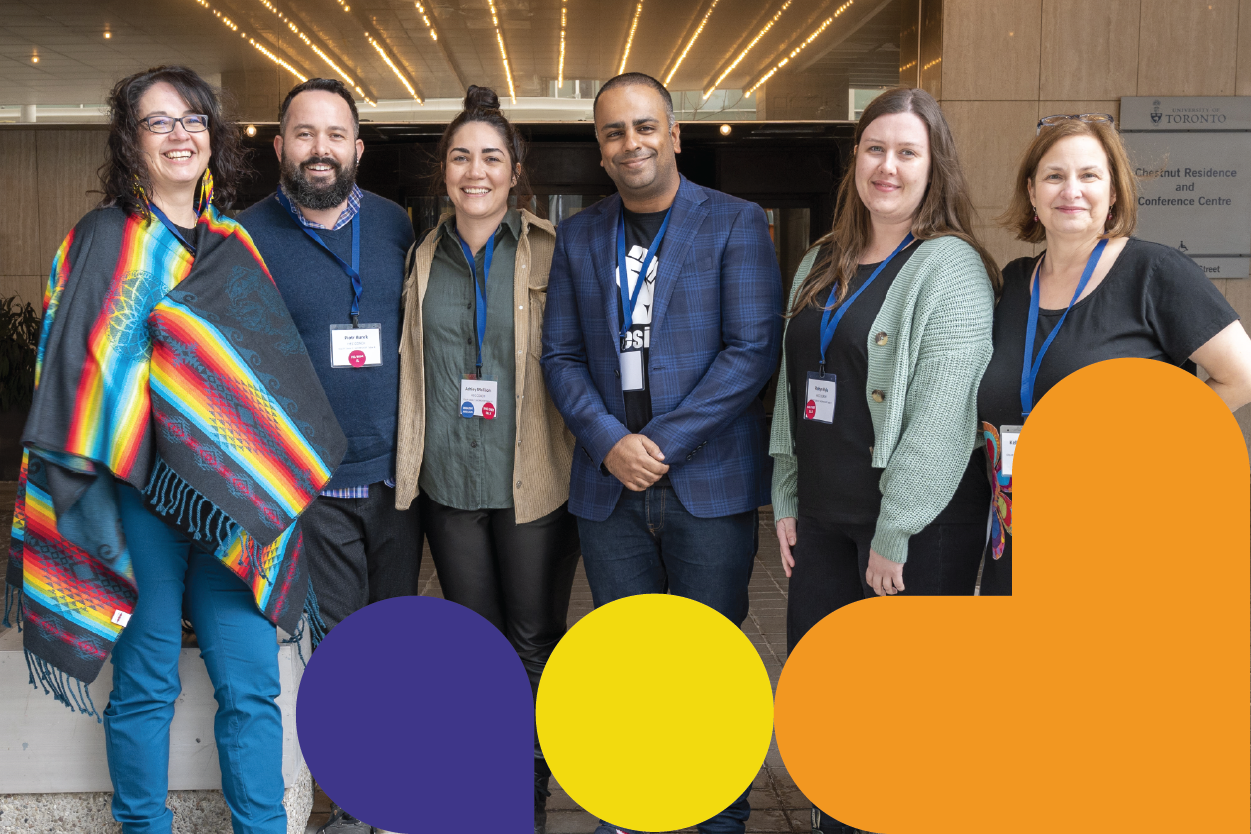Caption: A group photo of all the program coaches, including the blog authors Ashley, Kelli, Holly and Robyn.
By Ashley Mollison, Kelli Stajduhar, Holly Prince and Robyn Kyle
People experiencing homelessness or vulnerable housing are inadequately served by traditional models of care, including palliative care. This population also has significantly worse health outcomes than their housed peers – up to five times more heart disease, four times more cancer, and a reduced life expectancy of approximately 30 years. First Nations, Inuit and Métis people are also eight times more likely to experience homelessness.
This striking difference in access to care and health outcomes is a driving force behind the new Improving Equity in Access to Palliative Care collaborative. As part of the Federal Action Plan on Palliative Care, over $2 million in funding from Health Canada was provided to assist communities in improving access to palliative approaches to care with – and for – individuals experiencing homelessness or vulnerable housing. The collaborative is comprised of 10 communities across seven provinces, supported by HEC and the Canadian Partnership Against Cancer (the Partnership).
What we do as coaches
As coaches of this collaborative, we mentor, guide and work alongside participants in the 10 communities to measurably improve access to palliative care using a health equity approach.
A health equity approach is about recognizing the social, political, and economic factors contributing to inequities in access and care experience, with the goal of ensuring that everyone in Canada receives safe and high-quality healthcare. It’s also about directing adequate resources to those with the greatest need, which includes those experiencing homelessness and vulnerable housing.
What we want to share from the EQUIP workshop
All coaches in the collaborative bring lived experience in homelessness, experience working with people experiencing homelessness, or both. We wanted to build on this experience to strengthen the collaborative’s health equity approach and the support we provide as coaches.
That’s why we recently participated in Equipping for Equity workshop (EQUIP Health Care) – a health equity intervention that “enhances organizational capacity to provide equity-oriented healthcare, particularly for those who experience significant health and social inequities.” The key concepts of the workshop included three core concepts of equity: trauma and violence-informed care, harm reduction, anti-racism and cultural safety. Various tools and modules were explored before the workshop.
This workshop was invaluable to us as coaches and to collaborative participants because we were able to walk away with tools and concepts that can be applied to our shared work. That’s why we wanted to share some of our key learnings and reflections, to support healthcare providers and leaders who are also working to address health equity.
Ashley: We need to take the framing of this work off the people who need palliative care and onto the system. What shapes the ability of people to get care and support? How do environments of criminalization, discrimination and racism impact providers’ ability to provide care in the ways that people need and deserve it? Structural inequities impact the experiences of both those needing and providing care.
In this program, our work is equity in practice. What we learn from each other, this workshop and this program, helps to shift our thinking and actions and get to the root of equity work – the need for organizational and systemic change.
Kelli: There may be great palliative equity work happening, but it’s not always underpinned by the things needed to do this work meaningfully. This workshop was a reminder that it’s important to understand core equity concepts, slow down, and be thoughtful so that we can do this work in a good way.
We must recognize that we can cause harm when we step in with solutions that are not co-created with the community. As coaches, we use our experience and learnings to help teams tailor interventions, concepts and tools to avoid causing these harms.
Holly: In equity work, we need to recognize the structural inequities, violence and harms that First Nations, Inuit and Métis people in Canada experience because of the ongoing impacts of colonization. In identifying equity-oriented approaches for First Nations, Inuit and Métis people, we must acknowledge that they need to lead the way forward in developing models of care based on their worldviews, values and beliefs.
This workshop created the space to challenge colonial structural systems and provided opportunities to confront our power and privilege in creating more equitable and culturally safer spaces for First Nations, Inuit and Métis people within healthcare.
Robyn: We can foster equity in this space by bringing different voices together to help us connect concepts to real life. My background is in housing, shelters and community work, and how I have seen trauma and violence-informed care differs from that of somebody working in healthcare. But how can we come together now to fill in the gaps for one another?
This workshop allowed us to create a shared, multidisciplinary understanding of these key concepts and tools, which will help coaches and teams act on equity-oriented healthcare for people experiencing homelessness effectively.
What’s next?
This collaborative and workshop reaffirm the importance of integrating equity throughout the healthcare system, with a strong focus on patient safety and quality. We invite others to consider what’s needed to engage in conversations around equity at the individual, organizational and system-level.
What action can you take within your context to implement more equity-oriented practices? Check out HEC’s Equity, Diversity and Inclusion Virtual Learning Exchange series, or learn more about EQUIP Health Care.
